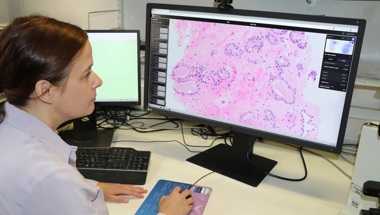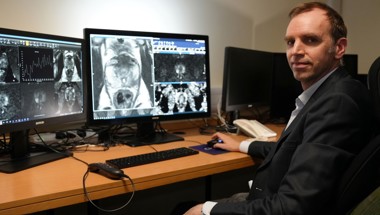Research
03 Nov 2025Can this cutting-edge AI tool change the way we diagnose and treat prostate cancer?
Our new £1.9 million study will test whether AI can make diagnosing and treating prostate cancer more accurate and more personalised. The research could see men with less harmful cancers spared the side effects of unnecessary treatment, while prioritising men with aggressive disease for urgent treatment.

A groundbreaking new study we're funding is set to test how artificial intelligence (AI) can make prostate cancer diagnosis more accurate, and treatment decisions more personalised – so that more men get the right treatment, at the right time.
The study will use a cutting-edge AI tool to give doctors clear and detailed information about each man's cancer, helping them decide whether monitor or treat it – and, if so, which treatment is best.
This is vital because, although the way we diagnose prostate cancer is safer and more accurate than ever before, it can still be challenging to figure out how aggressive each man's cancer is.
In some cases, this means men are treated with surgery or radiotherapy when they could instead be monitored on active surveillance, putting them at risk of life-changing side effects unnecessarily.
In other cases, men are missing out on treatment, allowing their cancer to spread and reducing their chances of survival.

Clearer, more precise information
Called the VANGUARD PATH study, the new research is being led by Professor Clare Verrill, Professor Richard Bryant and Dr Srinivasa Rao, all from the University of Oxford, and Professor Jonathan Aning from North Bristol NHS Trust.
They'll work with teams at NHS hospitals in Oxford, Bristol and Glasgow to investigate how the AI tool, developed by precision medicine company Artera, could give men and their doctors clearer, more precise information to guide their treatment decisions.
The first step will see the researchers test the AI tool on prostate biopsy samples from men who've already been diagnosed and treated for prostate cancer. This will enable the team to compare how well the AI's predictions match the real-world outcomes, such as which cancers were more likely to spread without treatment.
Once they show that the AI can make accurate predictions about which cancers need treating or monitoring, the team will test the tool in real clinics, on biopsies from men as they're diagnosed – focusing on particularly difficult cases where it's harder for doctors to decide which treatment is best for each man.
To do this, the tool will analyse biopsy samples in ways that humans can't, extracting detailed information about the cancer cells' appearance and structure. The technology will combine this information with information on the men's health to generate a risk score that can advise doctors on what the best treatment will be.
Want to hear more about Prof Clare Verrill's research? Join our free webinar on Jan 26, 2026 where she'll be answering your questions.
Better informed treatment decisions
At this stage, the AI analysis will be done alongside the usual report prepared by a pathologist and won't be used to influence the men's treatment decisions. However, the researchers will compare these decisions to what doctors would have decided if they had used the AI report, to see whether the tool would have helped them in those challenging cases.
Testing the tool in NHS hospitals to see how well it works in real life will also allow the researchers to understand how men and their doctors feel about using it, paving the way for smarter, more tailored prostate cancer care.
Professor Clare Verrill, lead researcher on the project, said: "This funding from Prostate Cancer UK will be truly transformational for men diagnosed with prostate cancer. It will pave the way for advanced AI technologies such as the Artera AI Prostate Biopsy Assay to be rolled out across the NHS.
"This will enable more detailed and precise information to be provided to men who will be able to make better informed decisions with their clinical team about whether they can be safely monitored or need treatment - and, if so, help guide those decisions."
This funding from Prostate Cancer UK will be truly transformational for men diagnosed with prostate cancer.
Personalising prostate cancer care for men
Dr Matthew Hobbs, our Director of Research, said: "AI has the potential to massively improve prostate cancer care and make sure that every man has the most accurate and best treatment plan for his specific cancer. We've been working with Artera for several years now and I believe that their AI tool is one of the most exciting ones to have been developed. But exciting AI tools can only make a difference if they can be properly evaluated.
"This new project from Professor Verrill and her team is so exciting, because it tests this new technology in real-world settings, meaning we can deliver the final evidence needed for it to be rolled out across the NHS. It's exactly the sort of high impact research our Transformational Impact Awards scheme supports – turning exciting innovations into proven real-life improvements for men with prostate cancer."
Andre Esteva, CEO and Co-Founder of Artera, said: "We developed the ArteraAI Prostate Biopsy Assay to help improve the lives of prostate cancer patients and have spent years gathering evidence about its potential impact. We're delighted to be working with Professor Verrill and her team to see how the test could be used to maximise benefit for men in the NHS and hope that we will soon see the tool being used to personalise prostate cancer care for men in the UK."
Minister for Public Health and Prevention, Ashley Dalton, said: "This groundbreaking research could be a huge step forward, demonstrating the power of technology to potentially transform lives and improve cancer outcomes.
"This is exactly why we're investing in a digital NHS. By harnessing AI and moving beyond outdated systems, we can transform cancer care - diagnosing earlier, treating more effectively, and improving patient experience."







